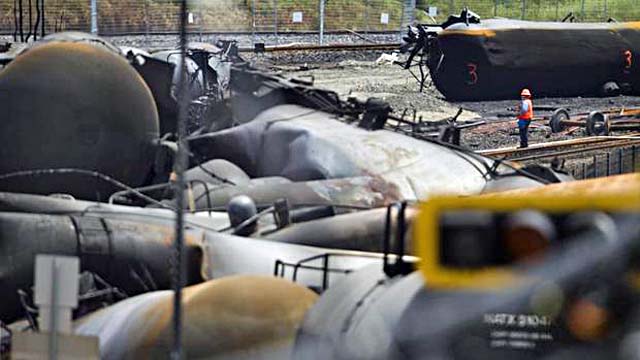

Crews work in the area of the derailed tanker cars - 14 Jul 2013 Peter Power.
1 October 2013 Lake Megantic Residents Split
Over Lawsuits Against MMA Lake Megantic Quebec - Nearly three months after an oil train derailed in Lake Megantic and set off explosions that killed 47, residents of the small town are being torn between a class action lawsuit in Quebec and seeking justice in an American courtroom.
Immediately after the accident, radio ads began playing on heavy rotation across Eastern Quebec inviting thousands to join a class action against the Montreal Maine & Atlantic Railway (MMA).
Two lawsuits were announced, one to seek damages in Quebec and a second in the Chicago suburb where the MMA's parent company is based. Lake Megantic plaintiffs can join both, but will eventually have to choose one because they cannot sue twice for one incident. Neither has yet been certified as a class action.
The railway went into receivership in early August, and since then, dozens of other companies involved in the ill-fated shipment have been added to both actions as defendants. Lawyers have warned that the damages from the two claims could far outweigh the cost of rebuilding the shattered town.
Many in Lake Megantic, which is still in mourning, are reluctant to discuss among themselves whether they will join either lawsuit. However, the owner of the bar at the epicentre of the disaster has told The Globe and Mail that he has launched a personal lawsuit in the United States. He will remain with the Quebec class action.
"I changed camps during the weekend," Yannick Gagne said in mid-September of remaining solely with the Quebec case. "Only crazy people don't change their minds."
The owner of the Musi-Cafe bar, Mr. Gagne continues to be one of the lead plaintiffs of the Quebec class action. The unmanned MMA freight train derailed behind the popular bar. Most of the people killed were there, asphyxiated nearly instantly by the firestorm, according to Quebec provincial police.
While he said he wished to remain "discreet," Mr. Gagne explained that he was troubled that he would receive an equal payout in a class action despite his larger loss.
Mr. Gagne's choice was rational, Regina-based class action lawyer Anthony Merchant said. In Canada, courts have limits on the amount of money they can award plaintiffs as compensation for non-economic damages. Illinois has no caps.
"You basically get nothing in Canada for non-economic damages. In the U.S., you might get millions," Mr. Merchant said.
While a U.S. court might grant higher damages, one of the lead lawyers in the Quebec lawsuit questions whether the Illinois lawsuit will be allowed to proceed because the case's connection to Quebec was weakened by the receivership of MMA.
"That's not the right forum, and even an individual action would have no jurisdiction," said Montreal-based lawyer Jeff Orenstein. "You'll have an American jury and foreign plaintiffs asking for millions from an American company. In Quebec, you'll have a Quebec judge who understands the people and the situation. I think they'll be more sensitive to the situation."
Court proceedings in both cases are expected before the end of the year.
Note: An earlier version of this story incorrectly stated that Yannick Gagne had dropped out of the Quebec class action. Mr. Gagne remains with the Quebec class action, but has also launched a separate personal lawsuit in the United States. This version has been corrected.
Justin Giovannetti.



Vancouver Island
British Columbia
Canada | 
